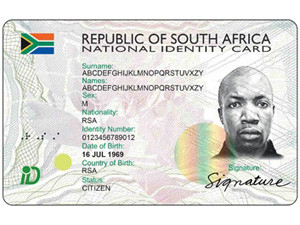
The Department of Home Affairs has issued more than one million smart ID cards in less than a year, and is confident of reaching its target of 1.6 million ID cards by the end of the 2014/15 financial year.
This was revealed by home affairs director-general Mkuseli Apleni, at a media briefing in the department's modernisation programme, on Wednesday.
"Our task is to ensure progressively that the over 38 million citizens with green ID books convert to the smart ID card by the time this process concludes; that is, in our lifetime.
"Our strategy is to issue smart ID cards, free of charge, to 16-year-olds, as well as those who are 60 years old and above," Apleni noted.
He stated that, as a fundamental departure from the old manual system and its inefficiencies, the department initiated the Live Capture system for smart ID cards and new passports.
"The intention was to replace all outdated systems of the old home affairs with new, secure, cutting-edge technologies. This also informed our department's radical migration from paper-based processes to the creation of a paperless environment," Apleni said.
"The modernisation programme should culminate in a complete overhaul of the manner in which we render public services in all our offices, including at the ports of entry."
The Department of Home Affairs has identified the introduction of smart ID cards and new passport as the leading elements of its modernisation programme, Apleni said, adding that, to date, of the 403 home affairs offices, 110 are equipped with the Live Capture system. By March 2015, he expects 140 offices would have been reached.
"I would like to reiterate the statement that our offices have the capacity to render services even when they are offline. In the design of the system we have the offline mode so that our offices should still be operational even when power is down, although as a temporary measure. Load shedding may impact on client service, but we have made provision for such eventualities," Apleni stated.
"We are engaged in discussions through the Department of Telecommunications and Postal Services, with SITA and Telkom to explore ways of facilitating office bandwidth upgrades, making provision of optic fibre cables for high-speed connectivity and mitigating cable theft in metropolitan areas."
Share